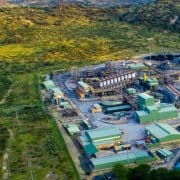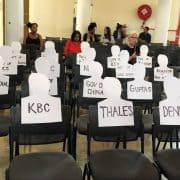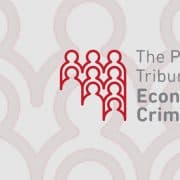|
Getting your Trinity Audio player ready...
|
• A cemetery in Phola, a black residential area near Witbank, from which some graves were relocated to make way for coal mining. Image: Supplied
South Africa’s mining sector has been in a state of upheaval for some years – not least because of the controversy surrounding the disbursement and use of mining royalties, those monies that are due to communities on whose land mining activities take place. This has been a focus are of Corruption Watch’s (CW) legal team, which has dug deep in its goal to find the cause of the controversy.
In March 2019 CW published the Mining Royalties Research Report, which details our engagements with mining communities and our investigations into reports of corruption, environmental harm, and unfair labour practice.
Our researchers found that communities who live on resource-rich land where mining activities are taking place, have been deprived of the benefits due to them. These communities are robbed of their livelihoods as profits from mining activities are not shared equally with them.
The report describes how vulnerable the royalties system as it leaves room for monies amounting to billions of rands being squandered, stolen or diverted because of infighting and maladministration of community funds.
A different problem for mining communities
Dineo Skosana, who holds a PhD in Political Science, highlighted a different – but no less important – impact coal mining activities have on communities in Mpumalanga. Skosana is a coal mining researcher at Wits University’s Society, Work and Politics Institute (SWOP).
Even though reports and research tend to focus on the monetary value of mining, Skosana’s research puts a spotlight on an issue that often gets little or no media reportage.
In her doctoral research Skosana explored the contestation over African grave relocations in the coal-mining area of Ogies in the province of Mpumalanga. She found that dispossession of land, for instance, has been associated with the period of colonialism and apartheid, but in the new democratic South Africa, some communities still find themselves being robbed of their land, burial sites and heritage.
She discussed her findings in this article published recently on The Conversation. The full text follows below:
Dispossession in South Africa is associated with the period of colonialism and apartheid. As a result, not much consideration is given to how previously marginalised black communities continue to be dispossessed by coal-mining activities in democratic South Africa.
In a paper that formed part of my PhD research, I investigated what communities lose because of coal mining. The research was conducted in Ogies, a town that lies 29km south-west of Witbank (Emalahleni), in Mpumalanga province. I found that the relocations continue as a result of coal mining companies buying up land owned by white farmers. Black farm dwellers and labour tenants are given short shrift because the mining companies see houses – and graves – as mere movable structures and, therefore, replaceable.
Dispossession is historically thought about only in relation to land. But this framework is limited, given that relocation affects more than people’s homes. It happens to the graves of their families too. In my research I refer to this as loss of the intangible – families lose their spiritual security, identity, heritage and belonging. Household and grave relocations feature as an aspect of dispossession in my work.
Household and grave relocations
In my paper I traced the relocation of 120 families between 2012 and 2016 from Goedgevonden farm, Tweefontein farm and other farms in the vicinity of Ogies, 112km east of Johannesburg. Families were moved to make way for the Goedgevonden open-cast colliery mine, which is owned by the global mining giant Glencore.
As part of the relocation, at least 1,000 graves were relocated from Tweefontein farm. The graves belonged to former migrant labourers and labour tenants who came from various parts of South Africa and from other countries such as Mozambique and Swaziland. Most of the deceased people’s relatives live in the surrounding black townships such as Phola and Witbank. Others left a long time ago. This meant that some graves were claimed and others were not.
The study found that graves are subject to contestation because of contradictions in South Africa’s laws. On the one hand, the National Heritage Resource Act (1999) protects graves. But the South African Mineral and Petroleum Resources Development Act (2002) allows land to be used for mining purposes.
The result is that the laws undermine government’s stated objective of protecting previously marginalised communities.
Importantly the study also found that graves are material evidence of a history that is entangled with narratives of land dispossession and restoration – even today. Graves matter because they validate citizenship for African communities that were previously denied such status.
Relocating graves for mining activities removes the material obstacles to a company’s desire to make profit. For the affected families, though, the relocation erases the evidence of their historical ties to a place and, above all, disrespects their ancestors.
The relocations at Ogies left the families feeling spiritually vulnerable and disconnected from their ancestors.
Contradictions in the laws
Mining companies have to provide heritage impact assessment reports when they apply for mining rights, in line with the Mineral and Petroleum Resources Development Act and the National Heritage Resources Act.
The reports often detail the structures which will be impacted during development.
In section 36 of the Heritage Act, graves are classified and protected according to their age and spatial location (for example, inside or outside a formal cemetery). But these measures, which are meant to reduce any possible adverse effects of mining on communities, aren’t enough.
The Minerals Act trumps the Heritage Act in most cases. This is evident in that no mining right or development has been denied because of the existence of graves on the site. Moreover, mining houses, and to some extent heritage consultants who are hired by mines to facilitate the relocations, don’t understand people’s attachment to their homes, and the sacredness attached to ancestral remains, as well as the meaning of land in African communities.
The intricate meanings of land in African communities were best described by an anthropology professor, Peter Geschiere. He noted that when a child is born in most African communities, her umbilical cord is buried in the soil to mark the space to which she shall be returned when she dies. Essentially, the piece of land becomes sacred at the birth – and in death.
During the interviews with the families whose graves were relocated, it was evident that death only marked a disconnection with the physical body. The interviewees believe that the spirits of ancestors continue to live. They bring about good omens, but also bad luck if violated. Hence, the relocated families complained that the treatment of their ancestral remains – such as putting them in plastic garbage bags during the relocations and using child-like coffins for the reburial – caused them and the ancestors distress.
Intangible loss
The people’s stories reveal a continued violation of the previously marginalised black majority. Even in death, the colonial and apartheid-era experiences remain very much a part of post-apartheid South Africa.
• Dineo Skosana is a researcher at the University of the Witwatersrand. In her PhD research, for which she received funding from The Ford Foundation, Skosana investigated the impact coal mining activities have on communities like Ogies, a town that lies 29km south-west of Witbank (Emalahleni), in Mpumalanga province, which is a coal mining hub.








